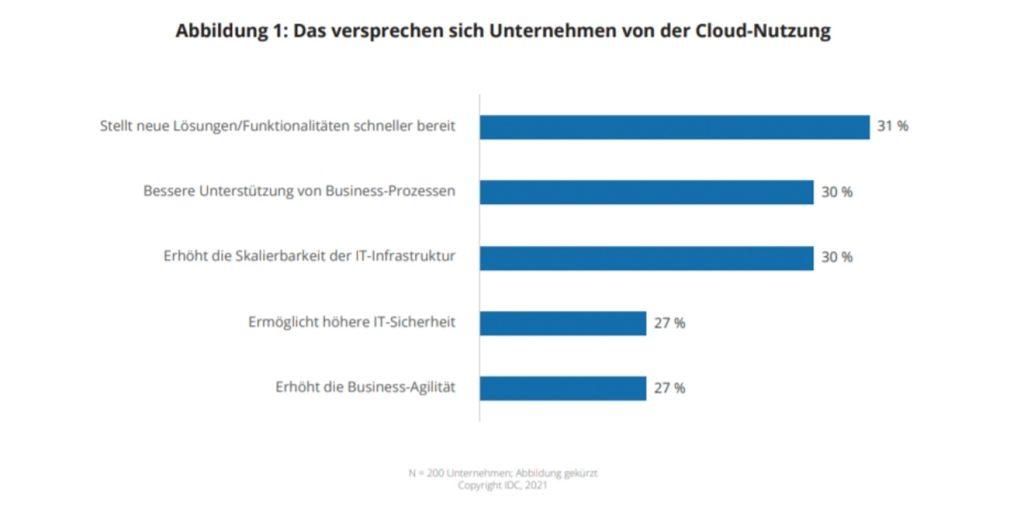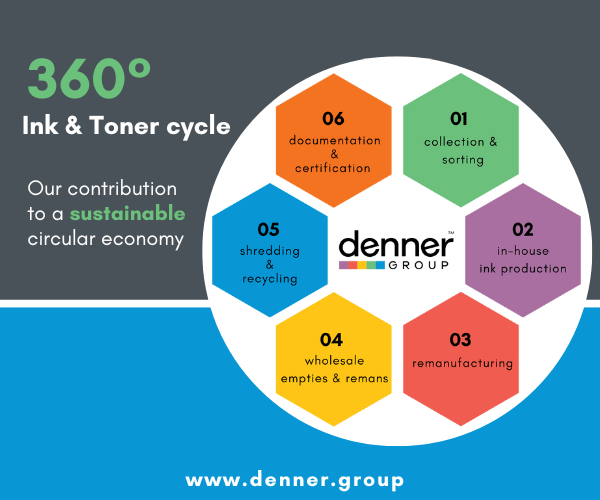95% of German companies operate cloud computing strategically
October 11, 2021
Until now, the cloud was just one element of information technology. In the future, it will be the central component and the dominant design principle, according to a recent study by IDC.
The IDC study “Cloud Infrastructures and Cloud Architectures in Germany 2021” gives a comprehensive insight into the plans and challenges of German companies in terms of IT infrastructure modernisation and shows the importance of the cloud in this regard. Using a structured questionnaire, 200 cross-sector organisations in Germany with more than 100 employees were surveyed in August 2021.
The cloud is becoming the centre of gravity for IT
So far, cloud-centric infrastructures have often been limited to the data centre. At the same time, public cloud services are being integrated more or less intensively into individual workloads. However, this architectural approach falls short. Compute and storage resources are becoming increasingly dynamic, but that is not enough to enable digitisation across companies and at all locations.
“The cloud is now increasingly becoming the centre of gravity for IT,” said Matthias Zacher, Senior Consulting Manager at IDC and Project Manager of the study. “The shift from the use of individual cloud services to a digital infrastructure framework with the cloud as the central delivery model will prevail over the next few years, as the results of our study suggest”.
Today this process is still in its infancy. 33% of the companies are planning to modernise their IT infrastructure comprehensively, as the business departments need greater flexibility and agility. These are not new requirements, but their urgency is increasing significantly with the pandemic. This also applies to greater automation and orchestration of IT and thus of business processes. With existing infrastructures, this requirement can only be met with great effort and therefore high costs, IDC said.
Multi-cloud is being readjusted
80% of the respondents use different types of cloud, the hybrid cloud is clearly the dominant model. The companies usually concentrate on a hyperscaler or infrastructure provider with whom they deepen their cooperation step by step. A second hyperscaler is being considered or evaluated in order to be able to benchmark or to be able to use services selectively. Only very large companies have a strategy that involves multiple hyperscalers. “A strategically positioned multi-cloud environment is only an option for a minority of companies, as the new study clearly shows,” explained Zacher. “We see a clear trend towards the hybrid cloud, while the multi-cloud strategy that has been propagated for several years is apparently becoming less attractive for the masses”.
The majority of decision-makers are currently driving the hybrid cloud forward intensively and using multiple structures more operationally and tactically for a specific workload. More than 95 percent of the companies surveyed have developed a cloud strategy. This is a further increase compared to the survey of the previous year and shows that modern IT infrastructure relies heavily on the cloud.
Use of co-location is increasing rapidly
Co-location services have shown a steadily growing level of usage for years. Last year it was almost 60% of the companies surveyed that use colocation, in 2021 it will be almost 80%. This solid growth speaks a clear language, IDC said: Co-location has arrived in Germany and has become an important component of the company-wide IT and cloud strategy. The reasons for using co-location services – security, faster provision of resources and access to the latest technology – are clearly aimed at optimising operations and increasing efficiency, because providers are able to set up their resources more efficiently and securely and continuously optimise them. Another important point for co-location is the fact that no investment in building new data centres is required. This saves time and lowers or makes costs more flexible.
Edge computing accelerates digital transformation
The discussion of centralised versus decentralised computing models is in full swing. One end is not foreseen. From IDC’s point of view, hybrid models based on the internal data centre, public cloud services and edge computing will continue to establish themselves here as well. The importance of edge computing for digital transformation has risen sharply in recent years.
From the point of view of 38% of those surveyed, edge is important for digital transformation and for 24% it is even a high priority. That is a total of 62% of the companies. In the digital transformation, real-time processes, low latency, comprehensive automation of processes as well as seamless data provision and data processing are fundamental requirements. Edge computing is making an increasingly important contribution here.
GAIA-X at the crossroads
The majority of respondents followed the European digitisation project GAIA-X with interest. 90% have dealt with it more or less intensively or at least took notice of this project. A good third of the decision-makers surveyed stated that they use GAIA-X offers. 26% have already decided against it, another third is still undecided.
GAIA-X also strengthens the position of local and regional providers; GDPR-compliant providers and European data rooms are very important to the decision-makers surveyed. The slow implementation, on the other hand, is a very clear point of criticism. The success of GAIA-X due to the high market dynamics around the cloud and digitisation, remains open and may require modifications to the original plans as well as the active involvement of all those involved in the project. From IDC’s point of view, GAIA-X has to deliver in the medium term to justify its relevance.
IDC concluded: “Modern IT infrastructure with the cloud as the basis is the enabler of the competitiveness of companies. The cloud remains the best way and the obvious choice to position yourself as the ‘company of the future’. The nationwide presence of a cloud strategy speaks for itself. The effectiveness of the cloud strategy will be a decisive factor influencing competitiveness and growth in the markets in which companies operate, as the results of the IDC study clearly underscore. Cloud computing today is in most cases the hybrid cloud. It best reflects the current requirements of the organisations. Only large companies can unleash the performance potential of the multi cloud today, because mastering the complexity is extraordinarily high.
“Companies will only be able to master current and future tasks with digital infrastructure frameworks with the cloud as a core element. From IDC’s point of view, the shift from the use of individual cloud services to this digital infrastructure framework is currently the most promising solution. Openness and the ability to integrate are the main requirements in order to be able to provide users with resources and functionalities from internal and external sources seamlessly. Organisations should therefore optimise and consolidate their technology, architecture and processes comprehensively today rather than tomorrow. That must be the common goal of providers and users.”
Categories : World Focus























